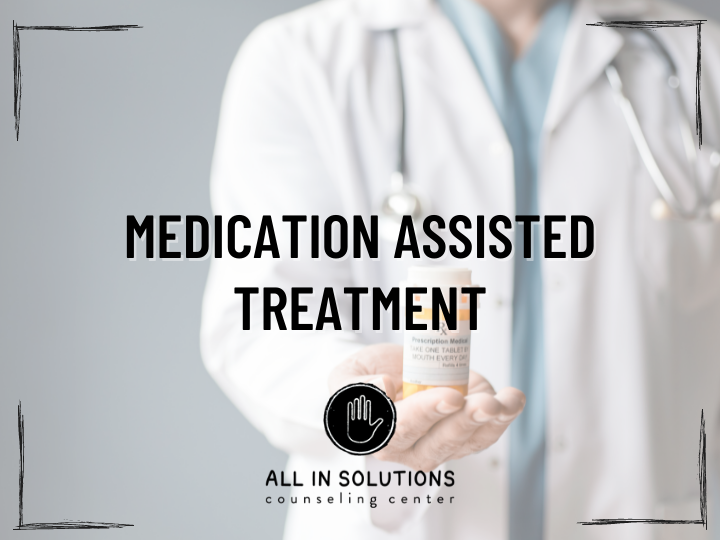All In Solutions MAT Program
Types of Medication Assisted Treatment Programs for Opioid Use Disorder
Opioid use disorder is a serious health issue that requires professional treatment. If you or someone you love is struggling with opioid use disorder, there are a number of medication-assisted treatment programs available that can help. This article will provide an overview of the most popular types of treatment programs and explain how they work. It will also discuss the effectiveness of these programs and the medications used in them. Finally, this article will provide information on how to find a MAT program and what to expect during treatment. So if you're ready to get your life back on track, read on for information on the best options available!
Types of treatment programs for opioid use disorder
There are many treatment options available for people with opioid use disorder, and it is important to speak with a doctor to find the best option for you. Some of the common treatment options include medication, counseling, and group therapy. Treatment usually lasts around 12-16 weeks and helps people live healthier lives without opioids. There are a variety of medication-assisted treatment programs (MAT) that can help people manage their addiction and live better life. You don't need to suffer in silence - get in touch with addiction treatment centers today and speak with a specialist about the best treatment program for you.

How medication-assisted treatment works
Opioid use disorder is a serious and often deadly problem that requires comprehensive treatment. The most common type of medication-assisted treatment for opioid use disorder is methadone maintenance therapy. Other medications used in treatment include buprenorphine/naloxone, naltrexone/referral to specialty care, and Vivitrol injections. All of these therapies involve extensive social and behavioral therapies as well as pharmaceuticals to help people live healthy lives without opioids. These programs are very successful in helping people achieve long-term sobriety and manage opioid use disorder effectively.
MAT Effectiveness
Opioid use disorder is a serious problem that requires professional treatment. One of the most effective treatments for opioid use disorder is medication-assisted treatment (MAT). MAT programs use a variety of medications to help reduce cravings and symptoms of opioid use disorder. These medications are very safe and help to reduce addiction and relapse rates. People who want to try an intervention program without resorting to medication abuse or withdrawal effects should consider a MAT program. The medications used in these programs are very safe, and help to improve the quality of life for people with opioid use disorder. People can be anonymous when participating in a MAT program, which helps them feel comfortable discussing their addiction and seeking help from the professionals involved in the program.
MAT Medications
MAT medications are the most effective treatment option for opioid use disorder. They work by blocking the reward pathway in the brain, which decreases cravings and rewards associated with opioids. They can be used as an add-on to current therapy or can be used first to help break addiction before moving on to other therapies. If you are looking for a medication-assisted treatment program that is tailored to your specific needs, make sure to seek out a doctor who offers MAT medications.
Methadone
Methadone is a medication that is used to help people who are addicted to opioids. It helps to reduce cravings and withdrawal symptoms, and it can also help people stay in recovery. Methadone must be taken every day for the best results. There are many methadone treatment programs available around the world - find one that best suits your needs.
Suboxone
Suboxone is a medication that can be taken as an injection, tablet or liquid form. It helps to wean people off of opioids and into a lower dose over time. MAT medications come with a doctor's prescription and should only be used under the guidance of healthcare professionals.
Lucemyra
Lucemyra is a medication that can be very helpful in relieving opioid withdrawal symptoms. Not only does it help to diminish the intensity of withdrawal symptoms, but it also helps to reduce cravings and other related symptoms. There are various types of MAT programs available - residential, partial hospitalization, outpatient treatment etcetera - that meet the specific needs and preferences of each individual patient. Getting treatment through such a program can greatly improve one's chances of successful rehabilitation from opioid use disorder.
All In Solutions Medication-Assisted Treatment Program
Opioid use disorder is a serious and often chronic disorder that can be difficult to manage. Fortunately, there are a variety of treatment options available that can help provide relief from opioid use. medication-assisted treatment (MAT) is one of the most effective and popular options, as it combines medication with behavioral therapy. Keep reading to learn more about the different types of MAT programs and the medications that are used in them.
At All In Solutions, clients have the opportunity to receive MAT while continuing to receive traditional psychotherapy in group and individual settings. Clients receive medication management and oversight from qualified addictionologists, pharmacists, therapists, and counselors.
Each person in recovery has a distinct journey to recovery and varied reasons for taking on their addictions. Two patients will react differently to therapy attempts if they have varied life experiences, mental health issues, and treatment histories. Because of this, All In Solutions rejects the one-size-fits-all approach to client treatment that is based on a cookie-cutter model.
All In Solutions medication-assisted treatment patients have the chance to take part in creating a treatment plan that is specifically tailored to match their requirements, giving them the ability to lay the groundwork for long-lasting recovery. The alcohol and drug rehab provides a variety of specialized therapy components that may be combined to create a completely holistic program of recovery in addition to offering both inpatient and outpatient rehab.

